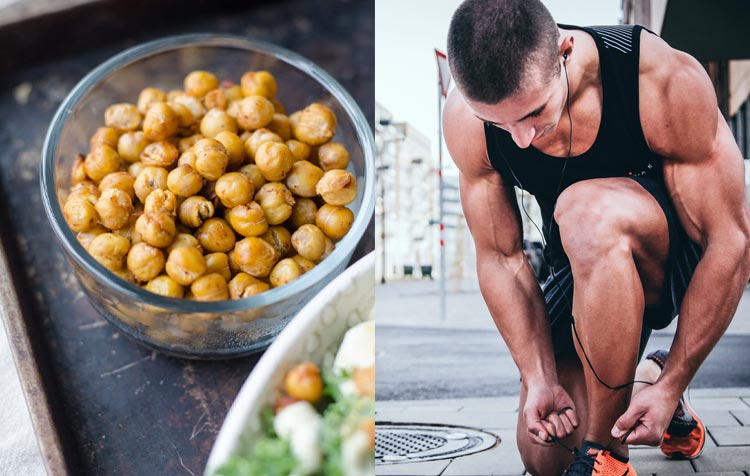You probably ended up here because you are interested in vegan muscle building interested! But is it even possible to become stronger and more muscular with a plant-based diet? For many people this seems unthinkable, since many Prejudices around the vegan diet, the vegetable and so protein-rich diet exist. For example, the image of the pale skinny vegan, as a prominent cliché.
The answer is of course yes! Even as a vegan, you usually consume enough protein to build muscle without meat, eggs and cow's milk.
But what do I need to consider when eating a plant-based diet to build muscle? Which nutrients are particularly important during intensive training? What do vegan athletes eat? Which foods or supplements contain the most important micronutrients for muscle building? Questions upon questions.
In this post you'll find all the answers, as well as some living examples, the general benefits of vegan diets, information on muscle building nutrition with tips for micro and macro nutrients, and other advice that will help you build muscle vegan.
For an overview, here is a table of contents for you:
- Examples
- Advantages
- Macronutrients
- Micronutrients
- Other nutrients
- Foods
- Food supplements
- More tips
- Closing words
Living examples that vegans can also build muscle
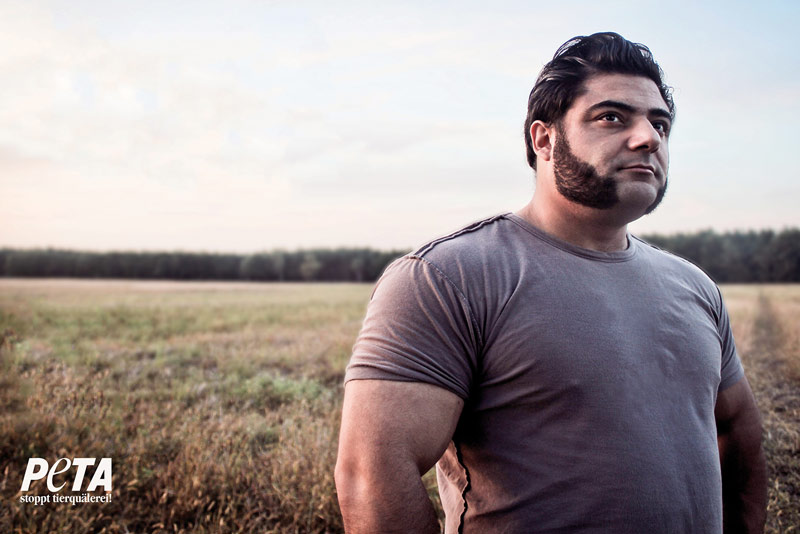
Good, prominent examples of muscular vegans include. Bodybuilder like Paul Unterleitner, Torre Washington or Nimai Delgado. The latter has actually never eaten meat in his life. Another vegan Power athlete is Patrick Baboumian, who won the competition in 2011. Strongest man in Germany won. Also the current number 1 in the tennis world rankings Novak Djokovic, basketball player Chris Paul or former professional boxer David Haye perform at their best - driven by plants.
Other examples of vegan athletes can be found in professional soccer, some of them are Sergio Agüero, Hector Bellerin, Jermain Defoe and also the former national goalkeeper Timo Hildebrandt. So with the right diet, vegan muscle building and top athletic performance are definitely possible.
Tip: In the article Vegan athletes you will find a whole list of famous athletes who eat a purely plant-based diet.
Advantages of herbal muscle building
That a plant-based diet is good for the Cardiovascular Health and protects against high blood pressure and atherosclerosis is now well known. However, healthy blood vessels also improve blood flow, allowing nutrients to reach cells better. This shortens the Regeneration time, which is a great advantage of the plant-based diet for muscle building.
The better blood flow can supply your cells with oxygen better, which generally improves the Performance increased. In addition, the vegan diet provides more secondary plant compounds and antioxidants, which protects your organism from oxidative stress and free radicals. This is also beneficial for your regeneration. In addition, the secondary plant substances also have an anti-cancer effect - and support the immune system. Fewer illnesses mean more time for your training and your vegan muscle building.
Macronutrients for muscle building
What needs to be considered in the diet for a more muscular body and which macronutrients are particularly important for muscle growth? What do vegan athletes eat to meet their additional calorie and nutrient needs? We now get to the bottom of these questions - and the answers are as simple as can be. All three macronutrients, proteins, fats and carbohydrates are important for plant-based muscle growth!
An essential condition to effectively build muscle is that you are in a Calorie surplus you are. This means that you take in more calories with your food than you burn through macronutrients.
Proteins
Regarding the vegan muscle building plays Protein an important role in the diet, as it contributes to the Muscle cell structure is used. However, there are many other important functions that protein performs in the body. These include transporting oxygen, building hormones and enzymes, and supporting the immune system.
How much protein is needed for vegan muscle building? Basically, athletes and sportsmen are given a increased protein intake recommended. Amateur and recreational athletes are recommended with 1.2 to 1.6 grams of protein per kilogram of body weight (g/kg bw) are well supplied. For strength athletes and targeted muscle building are amounts of 1.8 to 2.0 g/kg bw sensible. Consequently, protein in the diet for plant-based muscle building should account for about 15 to 25 percent of the calories supplied. By the way, adequate calorie and protein intake is more important than the timing of meals. Good vegetable protein sources are for example nuts and seeds, soy products such as tofu or tempeh, Legumes and also some whole grain products.
Tip: If you're serious about working out, you should still distinguish whether you're in a caloric surplus or deficit. At Calorie surplus about 1.8 g/kg body weight is recommended. However, should you just healthy slimming and you in the Calorie deficit the protein requirement increases. By eating fewer calories than you need, the body begins to break down fat and muscle. With an increased protein intake of about 2 g/kg body weight, you can maintain the muscles in the best possible way.
Healthy fats
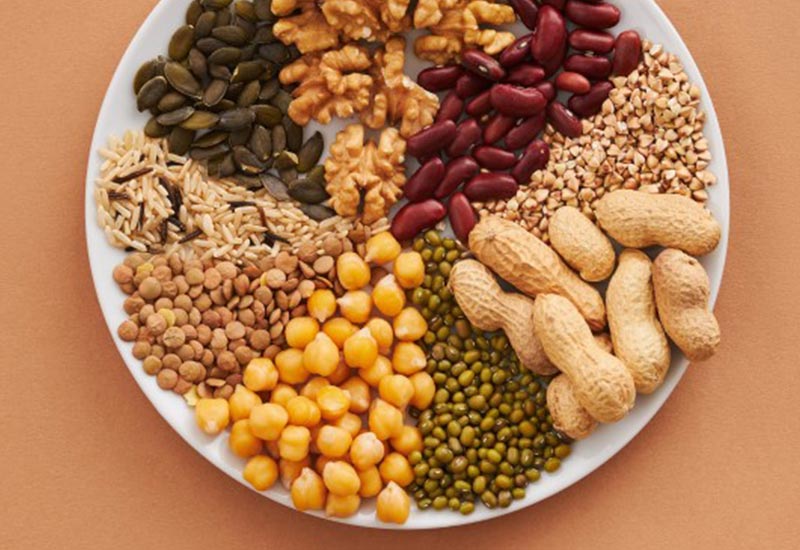
Also Fat have an important role in the plant-based muscle building diet, because they are important for many processes in the body. Because fats are a important energy supplier and therefore an essential part of the calorie intake. In fact, as mentioned earlier, you can only build muscle vegan if you are in caloric surplus. In addition, fats optimize the Uptake of the fat soluble Vitamins A, D, E and K. The fat intake also affects the Testosterone production and thus your testosterone level, which in turn is relevant for muscle building. If you consume enough fats, your testosterone level increases and thus you can build muscles more efficiently vegan.
Special focus should be placed on the healthy Omega 3 fatty acids be laid. This improve blood lipid levels and heart health, protect against infectious diseases and have an anti-inflammatory effect. The anti-inflammatory effect shortens the recovery time.
In addition, I would like to mention the Trans fatty acids which you should avoid at all costs. This is because trans fatty acids increase the risk of lipid metabolism disorders and the harmful LDL cholesterol level, while they reduce the health-promoting HDL cholesterol. Consequently, they increase the risk of nutritional diseasessuch as cardiovascular disease, overweight and obesity. Trans fatty acids are mainly found in processed convenience foods, hydrogenated fats, and milk and meat from ruminants.
According to current knowledge, at least 15 percent, but better 20 to 30 percent, of caloric intake should be covered by fats if you want to effectively build vegan muscle. To Covering your fat needs are particularly suitable nuts, seeds, kernels, avocados, coconut meat, as well as high-quality, cold-pressed oils.
Carbohydrates
Carbohydrates are our most important energy supplier and thus the basis for a good workout. During training, carbohydrates provide a Stable blood glucose concentration and provide energy from glycogen stores. In addition, they are building material for RNA, DNA, connective tissue or cell membranes. With one hour of weight training you consume about 400 calories and to cover this increased nutrient demand, carbohydrates are very well suited.
The recommendations for carbohydrate intake are 5 to 10 g/kg bw/d, respectively. 50 percent or more of the calorie requirement should be covered by carbohydrates. Good carbohydrates are primarily unprocessed, such as fruits, root vegetables, legumes, whole grains and pseudocereals.
Micronutrients for vegan muscle building
The need for various micronutrients increases during intensive training. This can happen, among other things, because nutrients are excreted through sweat or the body consumes more due to the additional effort and the metabolic processes that occur.
What is now important in vegan muscle building and what do vegan athletes eat to provide themselves ideally with micronutrients?
- Zinc is needed for the production of enzymes of protein biosynthesis, therefore a zinc deficiency inhibits muscle building. You can find plenty of zinc in legumes or oats and can be supplemented with Vitamin C-containing foods optimize the intake.
- Calcium provides muscle contraction and is therefore important for an effective workout. Sesame seeds, hazelnuts and kale are wonderful plant sources of it.
- Magnesium also helps in the transmission of stimuli to the muscles, i.e. contraction, as well as in the production of energy. Rich suppliers of magnesium are cocoa powder, pumpkin seeds and sesame seeds.
- Chrome contributes to the fact that more glucose can be stored in the muscles instead of being converted into fat. In calorie surplus means that you build proportionally more muscle and store less fat. You can find the trace element in rice, wholemeal bread and wholemeal products.
- B1 and B3 are important due to the increased energy requirement, as they influence the energy metabolism. You can find both vitamins in peanuts and sesame seeds.
- B2 is important for energy and protein metabolism and is abundant in yeast flakes, almonds and mushrooms.
- B6 also serves the protein metabolism and is contained in yeast flakes, pistachios or sunflower seeds.
- Vitamin E is an excellent antioxidant and important for the metabolism of fats and proteins and therefore also an important factor for effective vegan muscle building. The vitamin is found in hazelnuts, almonds, sunflower seeds and whole grain products.
Other important nutrients
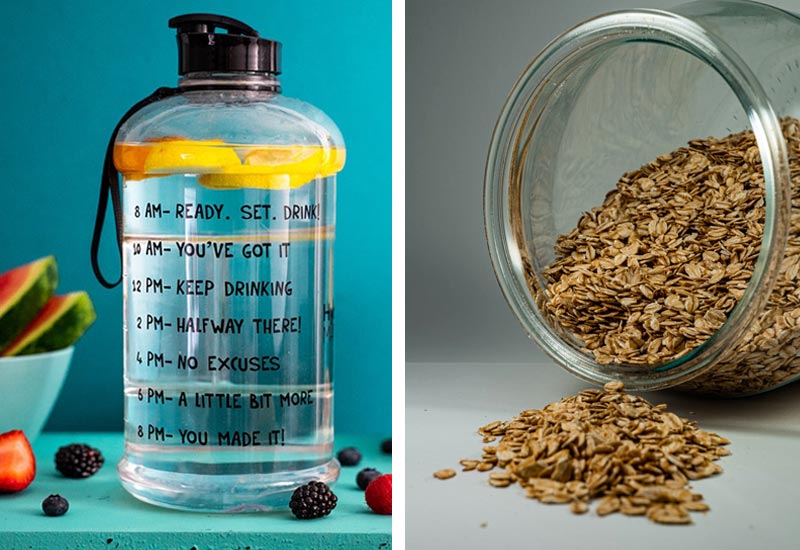
What else is important if you want to get fitter and more muscular as a die-hard vegan? What other nutrients do you need for effective plant-based muscle building? A key food is Water, as your body needs it for protein synthesis and metabolism. Through adequate drinking you can get closer to your training goal even faster.
The Amino acid leucine also activates protein synthesis. Protein biosynthesis is the process in which proteins are formed in cells, for example the formation of muscles. It is stimulated by high blood levels of glucose and essential amino acids, especially leucine, as well as training stimuli and a high energy status in the cells.
After training, you can either supplement leucine specifically in combination with protein or take essential amino acids, as they also contain leucine. In order to stimulate protein biosynthesis as much as possible, it makes sense to eat three to four meals a day, each of which contains About 30 grams of protein include.
What do vegan athletes eat to get stronger or stay muscular?
You have now already read about some foods that help you with plant-based muscle growth. Here I go again specifically on what you can eat for vegan muscle building and recommend you foods that I consider particularly target.
An important basis for your diet are Fruit and vegetableswhich provide you with many macro- and micronutrients, as well as secondary plant substances.
Nuts like Walnuts, almonds, cashews or hazelnuts are very good suppliers of fat, protein, iron, calcium and magnesium and thus cover a large part of your - for muscle building increased - micro- and macronutrient needs.
Seeds and kernels such as Pumpkin seeds, sunflower seeds or sesame seeds complement nuts very well, providing you with plenty of B vitamins, but also protein, fat and zinc.
Legumes like Chickpeas, red lentils, peas or beans ensure a balanced blood sugar level and provide you with important proteins and zinc. The high fiber content also increases intestinal health and reduces the risk of colon cancer.
Whole grain products like Oatmeal, millet flakes, whole grain bread or whole grain pasta. are good suppliers of carbohydrates, protein, B vitamins and the minerals zinc, magnesium, iron and Potassium.
Dietary supplements for muscle building
Which vegan dietary supplements are important for muscle building? Basically, less supplements are necessary than you think, however, there are some foods such as hemp protein, barley grass or maca powder that can boost your Improve regeneration and performance. Vegan muscle building can also be promoted with creatine or amino acids.
Hemp protein
Hemp protein is an ideal protein supplier with a good amino acid ratio, high L-arginine content and has many other advantages. Namely, it is easily digestible, has a high bioavailability, is hypoallergenic and rich in vitamin B2, zinc, magnesium and iron. Daily 25 grams of hemp protein already cover half of the daily requirement of iron and magnesium and a third of zinc and vitamin B6. Hand protein therefore not only provides protein, but also many micronutrients and is also an ecologically valuable food.
EAAS or leucine
Essential amino acids or leucine activate protein biosynthesis after training. You should take about 5 grams of essential amino acids together with hemp protein after training.
Creatine
At Creatine is a very well researched dietary supplement that many bodybuilders and strength athletes rely on. A regular supply of creatine increases performance because the energy stores in the muscles increase. Creatine is also believed to stimulate protein biosynthesis. About 5 grams of creatine per day are recommended.
Maca
The root from South America contains many amino acids and minerals. Particularly valuable are the minerals contained in the Maca root contained macamides, which increase testosterone levels. Vegan muscle building becomes a little more effective with Maca!
Barley grass powder
Barley grass contains an incredible amount of nutrients and therefore can help meet the increased nutritional needs due to muscle building. Among them are iron, calcium, chlorophyll, B vitamins, potassium and zinc. Furthermore, barley grass regulates the acid-base balance and thus acts salutogenetic on your health.
More tips for vegan muscle building
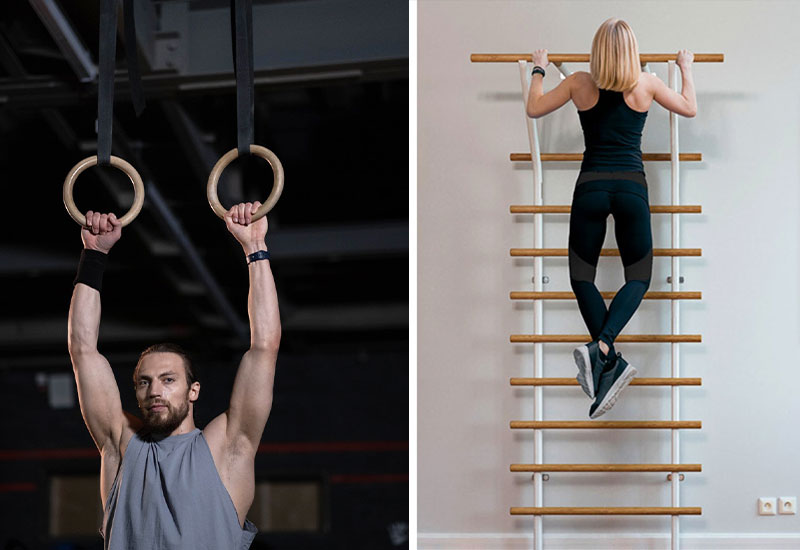
In addition to a plant-based muscle building diet, what other tips are helpful for building muscle even more effectively? With a wholesome and healthy diet, as well as targeted selected food supplements you have already laid a good foundation for your plant-based muscle growth. In the area of nutrition you can also Intermittent fasting inform that can also be very useful.
A very important factor that many often neglect is the Relaxation. Muscles grow during the regeneration phase, which is why you should make relaxation active. Yoga, Black Roll, meditation, a walk or sauna are just a few ways you can improve your recovery and muscle growth.
For a holistic training I recommend a Combination of functional strength and endurance workouts. The freer you can move, the more functional the workout, which is why I like to recommend training with gymnastic rings for muscle building. Since the rings are not fixed, your muscles must constantly provide stability, which has a great training effect. Vegan muscle building works with the rings, a healthy diet and a little discipline for sure!
Tip: You need No gymbut can also be used outside or train at home. With a yoga mat, gymnastic rings and a pull-up stand you are already well equipped and save yourself some money.
Vegan muscle building with plant power!
Stable muscles stabilize your joints, strengthen your cardiovascular system and bring you closer to your feel-good weight. These are many good reasons to build vegan muscle. Fortunately, vegan muscle building can be achieved efficiently with the right diet, some awareness of micro- and macronutrients, and consistent training.
You now know what vegan athletes eat to get an ideal supply of nutrients and how to make your training functional and effective. Now it's all about implementing the tips. Have fun with your training!
All the best,

P.S.: If you sustainably healthier living you are sure to find our contributions to Vitamin B12 or More energy in everyday life interesting for you.

